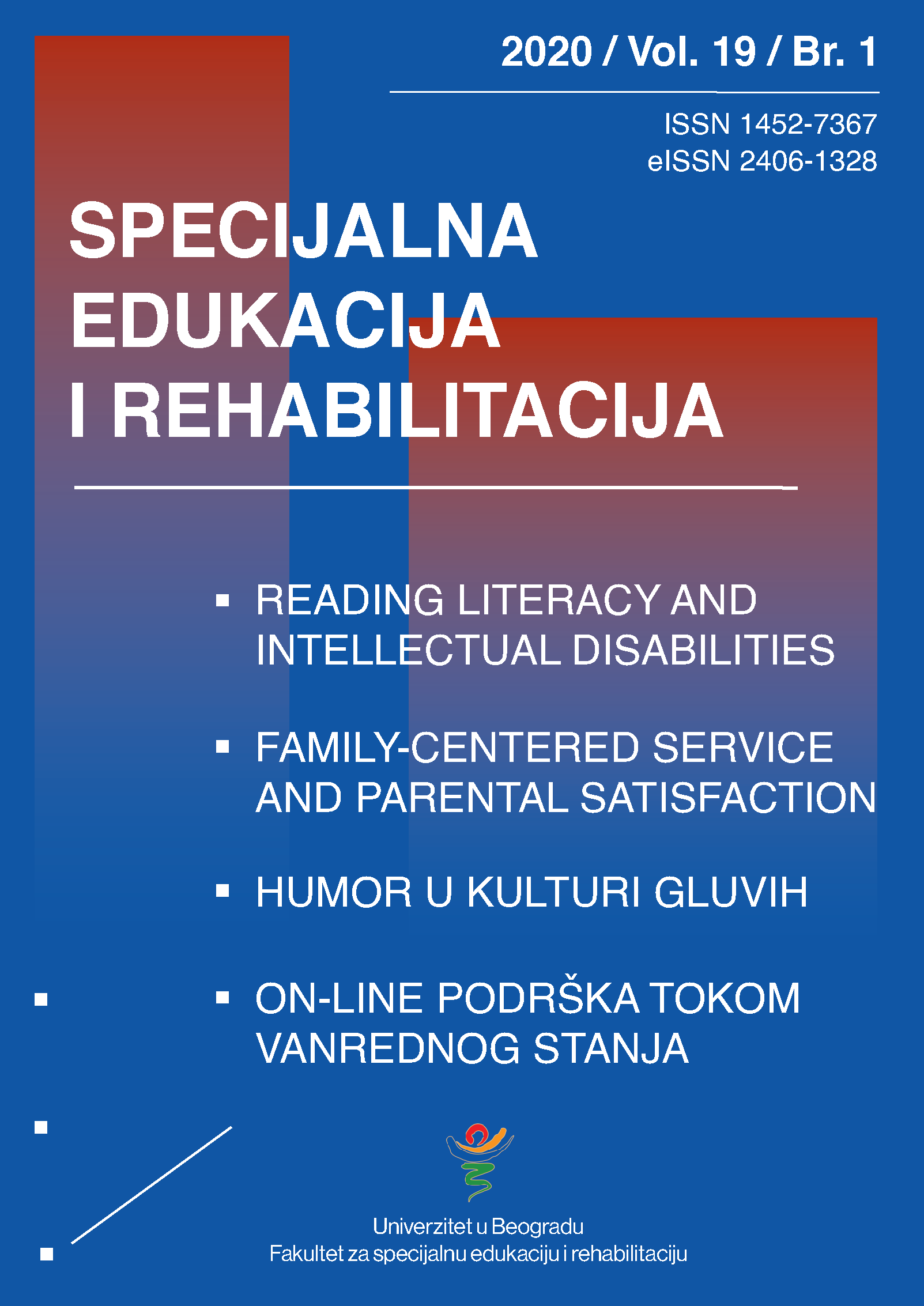On-line Support to People with Autism, their Families and Therapists in the State of Emergency
Abstract
Following the declaration of an international state of emergency due to the COVID-19 pandemic outbreak, in many countries, direct treatment of people with autism was suspended. With the introduction of the state of emergency in Serbia, effective from mid-March 2020, all forms of direct support to people with autism and their families were prevented. Instead, new forms of support in the virtual environment were increased and introduced. The purpose of this paper is to present forms of online support for people with autism during the state of emergency, in which the authors participated. Beneficiary users were either direct (people with autism spectrum disorder) or indirect (their parents and therapists). Depending on the time of effectuation, support was synchronous (in real-time) or asynchronous (appropriate materials available on the internet without direct contact between the support provider and client). Synchronous form of direct beneficiary users was the Youth Club, which included six people with high-functioning autism whose social skills treatment was accomplished in small groups, once a week, via video chat. Indirect beneficiary users in real-time support were parents who used online counseling services and early intervention providers who attended one-time online mentoring support. Asynchronous models included specially designed guidance for caregivers of people with autism in a state of emergency and a social story. Past experience indicates the need to create special protocols for dealing with people with autism in the state of emergency.
References
Andanson, J., Pourre, F., Maffre, T., & Raynaud, J. P. (2011). Les groupes d’entraînement aux habiletés sociales pour enfants et adolescents avec syndrome d’Asperger: Revue de la littérature. Archives de Pédiatrie, 18(5), 589-596. https://doi.org/10.1016/j.arcped.2011.02.019
Asbury, K., Fox, L., Deniz, E., Code, A., & Toseeb, U. (2020, April 21). How is COVID-19 affecting the mental health of children with special educational needs and disabilities and their families? https://doi.org/10.31234/osf.io/sevyd
Barry, T. D., Klinger, L. G., Lee, J. M., Palardy, N., Gilmore, T., & Bodin, S. D. (2003). Examining the effectiveness of an outpatient clinic-based social skills group for high functioning children with autism. Journal of Autism and Developmental Disorders, 33(6), 685-701. https://doi.org/10.1023/B:JADD.0000006004.86556.e0
Broder-Fingert, S., Brazauskas, K., Lindgren, K., Iannuzzi, D., & Van Cleave, J. (2014). Prevalence of overweight and obesity in a large clinical sample of children with autism. Academic Pediatrics, 14(4), 408-414. https://doi.org/10.1016/j.acap.2014.04.004
Cao, S., Qi, Y., Huang, Q., Wang, Y., Han, X., Liu, X., & Wu, H. (2020). Emerging infectious outbreak inhibits pain empathy mediated prosocial behaviour. https://doi.org/10.31234/osf.io/5p8kd
Chen, M. H., Su, T. P., Chen, Y. S., Hsu, J. W., Huang, K. L., Chang, W. H, Chen T., & Bai, Y. M. (2013). Comorbidity of allergic and autoimmune diseases in patients with autism spectrum disorder: A nationwide population-based study. Research in Autism Spectrum Disorders, 7, 205-212. https://doi.org/10.1016/j.rasd.2012.08.008
Cox, D. J., Plavnick, J., & Brodhead, M. T. (2020). A proposed process for risk mitigation during the COVID-19 Pandemic. Behavior Analysis in Practice. https://doi.org/10.1007/s40617-020-00430-1
Đorđević, M., Brojčin, B., i Glumbić, N. (2019). Multikomponentne bihevioralne intervencije u specijalnoj edukaciji. Univerzitet u Beogradu – Fakultet za specijalnu edukaciju i rehabilitaciju.
Hossain, M. M., Sultana, A., & Purohit, N. (2020). Mental health outcomes of quarantine and isolation for infection prevention: A systematic umbrella review of the global evidence. Epidemiology and Health, Article e2020038. https://doi.org/10.4178/epih.e2020038
Mitchell, K., Regehr, K., Reaume, J., & Feldman, M. (2010). Group social skills training for adolescents with Asperger syndrome or high functioning autism. Journal on Developmental Disabilities, 16(2), 52-63.
Narzisi, A. (2020). Handle the autism spectrum condition during Coronavirus (COVID-19) stay at home period: Ten tips for helping parents and caregivers of young children. Brain Sciences, 10(4), Article 207. https://doi.org/10.3390/brainsci10040207
Pan, P. Y., Tammimies, K., & Bölte, S. (2019). The association between somatic health, autism spectrum disorder, and autistic traits. Behavior Genetics. https://doi.org/10.1007/s10519-019-09986-3
Qian, M., Wu, Q., Wu, P., Hou, Z., Liang, Y., Cowling, B. J., & Yu, H. (2020). Psychological responses, behavioral changes and public perceptions during the early phase of the COVID-19 outbreak in China: A population based cross-sectional survey. https://doi.org/10.1101/2020.02.18.20024448
Reichow, B., Steiner, A. M., & Volkmar, F. (2012). Social skills groups for people aged 6 to 21 with autism spectrum disorders (ASD). Campbell Systematic Reviews, 8(1), 1-76. https://doi.org/10.4073/csr.2012.16
Rodriguez, K. (2020). Maintaining treatment integrity in the face of crisis: A treatment selection model for transitioning direct ABA services to telehealth. Behavior Analysis in Practice. https://doi.org/10.1007/s40617-020-00429-8
Simonnet, A., Chetboun, M., Poissy, J., Raverdy, V., Noulette, J., Duhamel, A., Labreuche, J., Mathieu, D., Pattou, F., Jourdain, M., The Lille Intensive Care COVID‐19, & Obesity Study Group. (2020). High prevalence of obesity in severe acute respiratory syndrome coronavirus‐2 (SARS‐CoV‐2) requiring invasive mechanical ventilation. Obesity. https://doi.org/10.1002/oby.22831
Toseeb, U., Asbury, K., Code, A., Fox, L., & Deniz, E. (2020). Supporting families with children with special educational needs and disabilities during COVID-19. doi: https://doi.org/10.31234/osf.io/tm69k
Tse, J., Strulovitch, J., Tagalakis, V., Meng, L., & Fombonne, E. (2007). Social skills training for adolescents with Asperger syndrome and high-functioning autism. Journal of Autism and Developmental Disorders, 37(10), 1960-1968. https://doi.org/10.1007/s10803-006-0343-3
Yarımkaya, E., & Esentürk, O. K. (2020). Promoting physical activity for children with autism spectrum disorders during Coronavirus outbreak: benefits, strategies, and examples. International Journal of Developmental Disabilities. https://doi.org/10.1080/20473869.2020.1756115
Zuckerman, K. E., Hill, A. P., Guion, K., Voltolina, L., & Fombonne, E. (2014). Overweight and obesity: prevalence and correlates in a large clinical sample of children with autism spectrum disorder. Journal of Autism and Developmental Disorders, 44(7), 1708-1719. https://doi.org/10.1007/s10803-014-2050-9
Copyright (c) 2020 Specijalna edukacija i rehabilitacija

This work is licensed under a Creative Commons Attribution-ShareAlike 4.0 International License.

